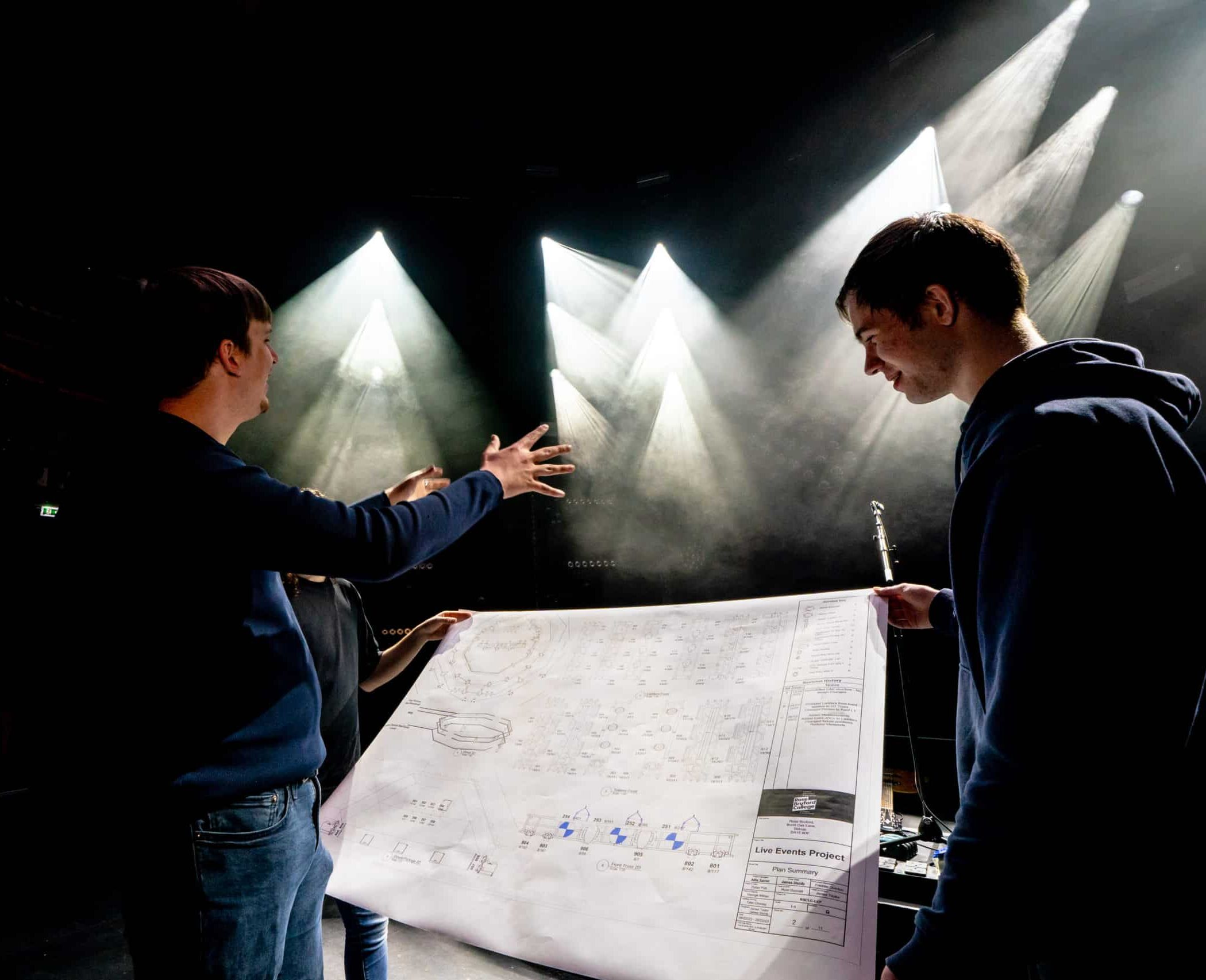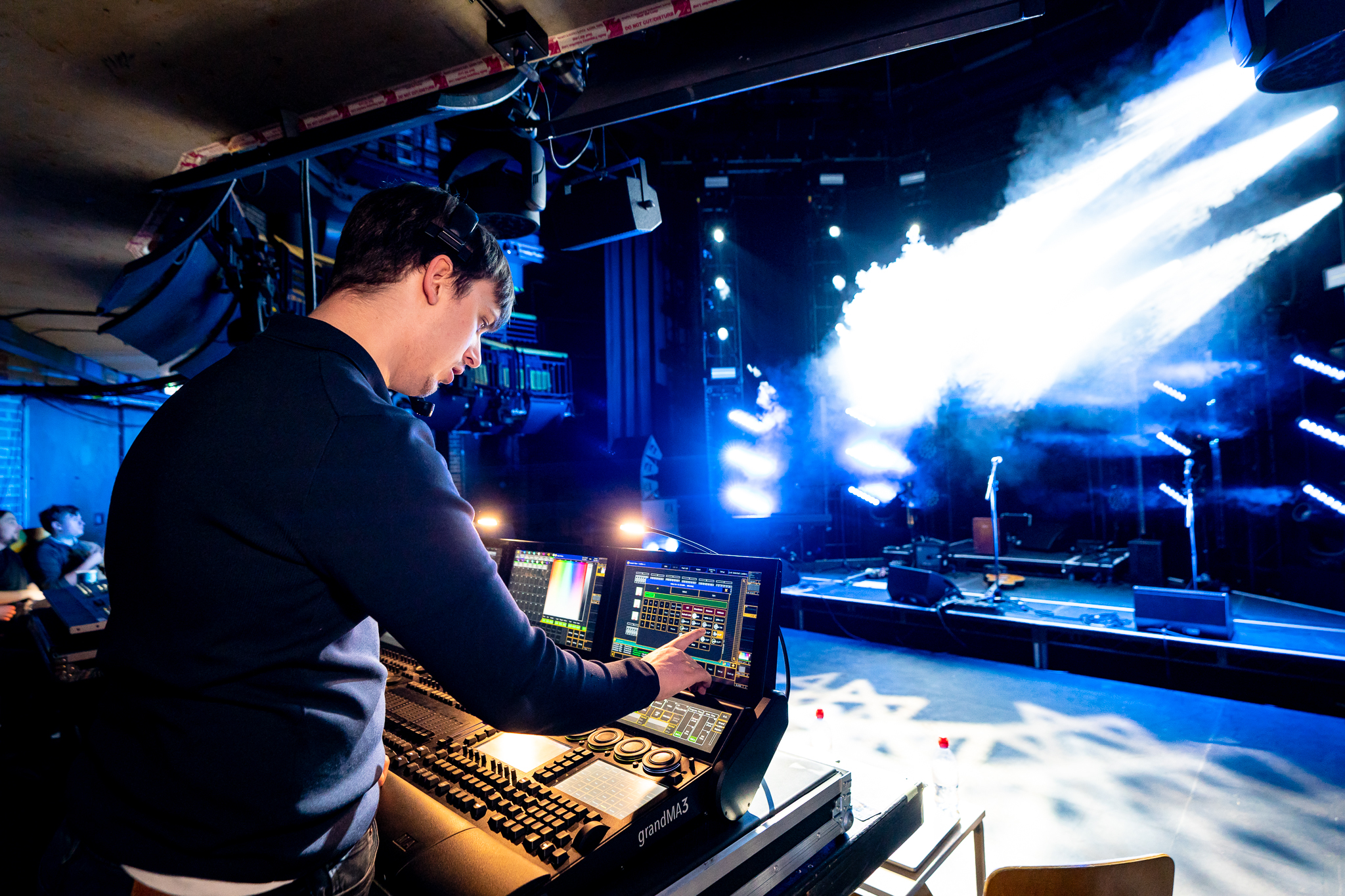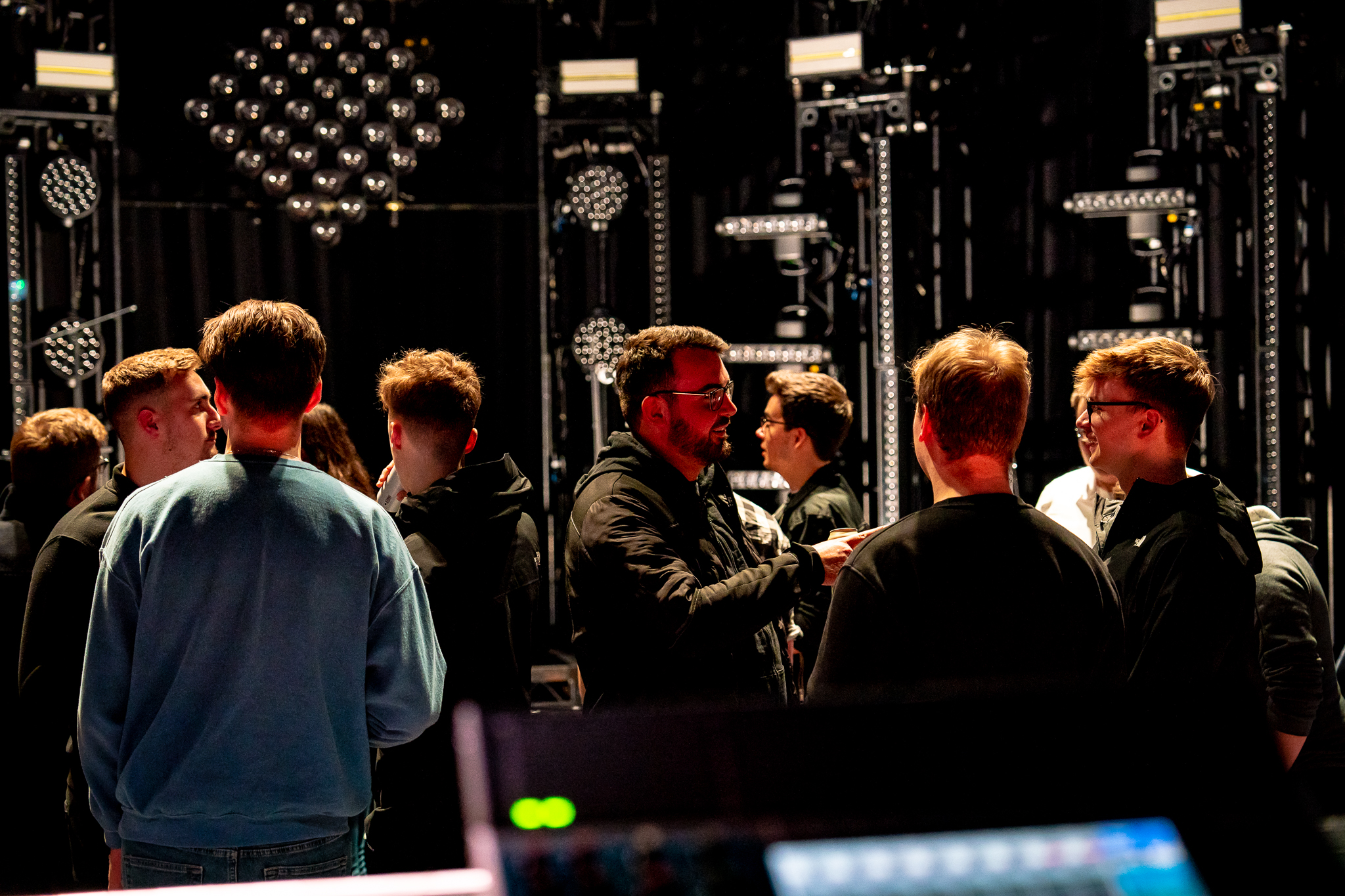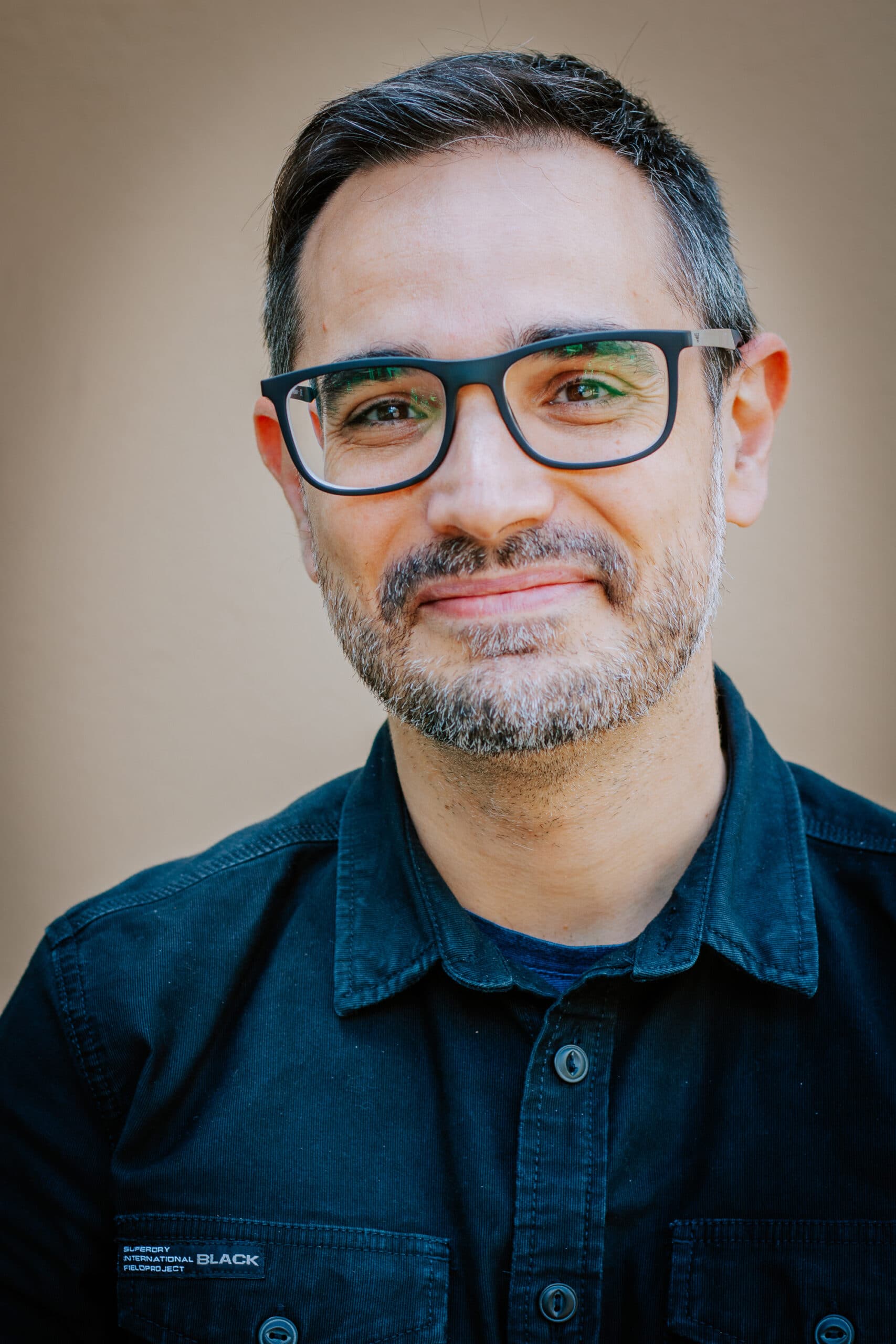
What you'll study
This course was created in response to industry demand for specialists. It will develop you as a creative, technically adept person who can make imaginative use of technology and bring a designers vision into reality.
You will learn about lighting and video programming/design, show control and interactive technologies, networked systems and stage electrics, projection systems and digital visual content, 3D visualisation, computer-aided design and technical management. And by working closely with industry partners who teach specialist skills and provide placements, you learn the current professional practice.
Creative Lighting Control with Lighting Design pathway
In Year Two you have the option to pursue the Creative Lighting Control with Lighting Design pathway, where you can explore approaches to designing and working with light, while gaining indemand industry skills.
You will learn innovative approaches to designing and working with light, acquire in-demand skills, and collaborate with industry lighting designers and practitioners.
We will introduce you to current uses and applications of light, with a focus on how it is applied to performance. Our aim is to give you specialist skills for a variety of settings – our graduates who undertake this pathway typically find employment in dance, opera, live music, film, events and commercial settings.
You will also learn the practical, design, and technical skills of a lighting designer. The areas of study include the core principles of lighting design, visual media technologies, video and production skills, learning to design and implement lighting systems for live events and taking on the role of a lighting designer in College productions.
Our pathway students receive valuable practice-based opportunities including industry placements with a range of partner organisations, both in the UK and overseas. You will also have opportunities to work on individual or collaborative projects, building your work portfolio and professional network ready for when you graduate.
There is also an independent research project.

Why choose this course?
Career-focussed
Gain experience of software and collaborating just as you will in the real world. All while gaining a breadth of knowledge and insight into techniques you can put to use across live music, theatre festivals, architectural installations and corporate events
Learn from working industry professionals
All visiting tutors are industry professionals and have recently included people from Avolites, Whitelife, TSL, ETC and Hippotisers. Previous tutors included Andy Voller (Lighting Programmer 2016 Olympic Opening Ceremony), Willie Williams (Visual Designer– U2, David Bowie, Complicite)
Professional Experience
Build your professional knowledge and network through placements and a 2-4 week work experience in year 3. Our industry links introduce you to an invaluable professional network and students in year 2 and 3 often work as freelancers alongside studying
Build your portfolio and practical experience
Deliver your own live projects, producing work that will be made and you can see in a real scenario. On our popular Live Event project you will run every aspect from coming up with a design, dealing with the hiring companies and then deploying it
Industry real facilities
You will train on lots of different consoles, either that we have or that are hired in. This includes: Lighting consoles - ETC Eos, GrandMA 2 and GrandMA 3, Avolites, Chamsys; Visualisation - Vision, WYSIWYG; Video - D3 Hippotiser, Notch, AutoCad and Vector Works

Course breakdown
Course content is regularly reviewed to keep it relevant and current. Course modules are therefore subject to change.
Year 1
You will begin to learn the practical and technical skills of the creative lighting control specialist and contextualise these in a developing understanding of the creative and performing industries.
These skills will be developed through laboratory work, projects and experience in simulated professional contexts. On completion of level 4, you will be able to:
- Identify key principles and concepts informing the discipline of Creative Lighting Control
- Demonstrate knowledge of a range of lighting and visual media technologies and systems used in live performance
- Employ basic techniques, practices and processes of Creative Lighting Control
- Form arguments and make judgements in accordance with basic theories and concepts
- Develop personal and transferable skills suitable for employment
Year 2
You have the option to pursue the Creative Lighting Control with Lighting Design pathway, where you can explore innovative approaches to designing and working with light, while gaining indemand industry skills.
Your skills will be further developed towards a level appropriate to professional work as you are given experiences that simulate professional contexts. Year 2 module study options include, but are not limited to:
Programming Styles and Practice
This module aims to bring your programming skills to a level appropriate to the industry and develops your understanding of the profession of the Programmer through practical performance projects and/or industry placements. The module will introduce you to professional production processes, and to a range of professional issues that will frame your future work. You will learn about live lighting and/or video design, operation and implementation, and apply it to a variety of production contexts and roles.
This module examines fundamental theories and practices of live event production. You will examine a range of conventions and practices, as well as the key practitioners, who have adopted visual media as a central element of performance. You will apply skills acquired during level 4 to new performance spaces, thus presenting you with a new set of technical challenges.
Through a realised project, you will learn to work to a client brief. You will assess and evaluate the needs of the performance event and the space in which you will operate, and design the visual system accordingly.
You will work with a group of your peers, and depending on the event, you may work with students from other programmes and/or external organisations. As a group, you will take responsibility for delivering all aspects of the brief, adapting your approach and processes to meet changing circumstances, and logistical and resource constraints.
Systems, Operation and Management
This module will introduce you to a range of control systems, operation and management practices and technologies. As well as giving you an opportunity to test and further develop your practical abilities in setting up and operating performance lighting/video systems, you will be able to observe how lighting/video is integrated into a performance during the creative process, and its role in the audience’s experience of the performance event.
In this module, you will typically:
- Undertake managerial and/or operational roles on college based performance projects
- Examine examples of the uses of network technologies and show control systems in a variety of environments
- Manage a budget, following College financial procedures, and in consultation with others
- Manage resources of equipment, schedule and crew, within the overall framework set by
- Manage all health and safety issues relating to your area of responsibility, within College and relevant professional and regulatory protocols and requirements
- Take responsibility for the implementation of the lighting/video design in a performance/project
- Support a lighting/video designer in the development of the design
- Work with team members from a variety disciplines using appropriate vocabulary
- Work to deadlines in an effective and efficient manner, responding to changing briefs and circumstances in a dynamic manner
- Study production processes as part of a creative, artistic enterprise.
Year 3
You are expected to be a self-directed learner at year 3. Module study options include, but are not limited to:
This module asks you to consider how – as a professional technologist – you can adapt to the changing requirements of different modes and scales of performance, and the variety of interdisciplinary roles within them. The module gives you the opportunity to analyse the skillset, techniques, processes and creative potential of a Specialist Practitioner.
You will typically undertake two project roles and/or an extended industry placement, to examine their professional requirements in more detail.
The production roles may include, but are not limited to:
1. Technical Manager
2. Lighting or Media Programmer
3. Head of Visualisation
4. Head of Lighting
5. Media Designer
6. Media Content Creator
Professional Preparation and Practice
This module focuses on the professional environment you are likely to encounter as a practitioner, and on your professional development. You will select a specific sector of the industry to examine in more detail, interrogating the work methods, processes and employment ecology of the sector. Depending on your own chosen career path, you may look at businesses, individuals (generally self-employed professionals) or a mixture of both as a comparative analysis. You will then choose to focus your research on either an employment or self employment pathway.
The module will also prepare you to transition from study to professional practice, whether you are an employee or self-employed.
Teaching and assessment methods
In your first year, you will complete around 320 hours of indicative scheduled learning and teaching activities and 880 hours of independent learning on projects, productions, placements or self-directed study. Assessment will be through: Coursework, presentations, assessed tutorials and portfolios
In your second year, you will complete around 180 hours of indicative scheduled learning and teaching activities and 1020 hours of independent learning on projects, productions, placements or self-directed study. Assessment will be through: Coursework, presentations, assessed tutorials and portfolios
In your third year, you will complete around 60 hours of indicative scheduled learning and teaching activities and 1140 hours of independent learning on projects, productions, placements or self-directed study. Assessment will be through: Coursework, presentations, assessed tutorials and portfolios
Programme specification
Get a flavour
Your future career


We aim to put you in front of and amongst the profession. This includes the opportunity to network and undertake a placement, as well as introducing your work to the industry at our graduate exhibition in London.
Alumni success
Tom Young
Lighting, Strictly Come Dancing; Lighting programmer 2014 Common Wealth Games ceremonies
Luke J Collins
Video Content Programmer and Operator, Eurovision
Matthew Kemp, Andrew Bruce and Joe Lott
Established the company Quantum Creatives, Touring artists (incl The Vamps, Jorja Smith, Good Charlotte, Reading Festival); Theatre (regional tours and shows at venues like Dominion and The Albion)
Careers options
Studying an Arts related subject gives you a wide range of skills that can be put to use in many careers. Recent graduates have gone on to become:
- Lighting/video programmers for live events, theatre, tv & film
- Lighting and video designers
- Programmers and software developers
- Technical managers
- Information technology and telecommunications professionals
- Planning, process and production technicians
- Freelance and Creative start-ups
Testimonials from industry
What an outstanding group of students from Rose Bruford College this year! They dedicated many hours to prepare the lighting for their end-of-year show. A group of 7 strong students on the Creative Lighting Control BA (Honours) course, once again arrived at Neg Earth Lights with enthusiasm. Neg Earth provide technical resource, project management, industry expertise and encouragement alongside the lighting equipment so the students can prepare for their CLC show. They have set a high standard, and we look forward to seeing the final show come together soon.
Nancy Jones, Rental Co-Ordinator, Neg Earth Lights
How to join
Applications are now open for September 2026.
We only accept applications through UCAS.
Institution code: R51
Course code: WG46
UCAS Points
64 UCAS points*
This is equivalent to:
- Two C’s at ‘A’ level/AVCE,
- A Pass in a single AVCE Double Award at Grade C or above
- One Merit and two Passes at BTEC (QCF) National Diploma or equivalent,
- One Pass (D or E on the core) at T level or equivalent.
- Successful completion of the Access to HE Diploma in Production Arts
Portfolio
Our Portfolio page gives an overview of what we will ask you to provide once we receive your application.
Course Summary
Duration
3 years
Mode of study
Full time
Start date
September 2026
Course Type
Undergraduate Course
Course Fees (2026 Entry)
UK/Republic of Ireland students (Fee per year)
£9535
International students (Fee per year)
£22800

